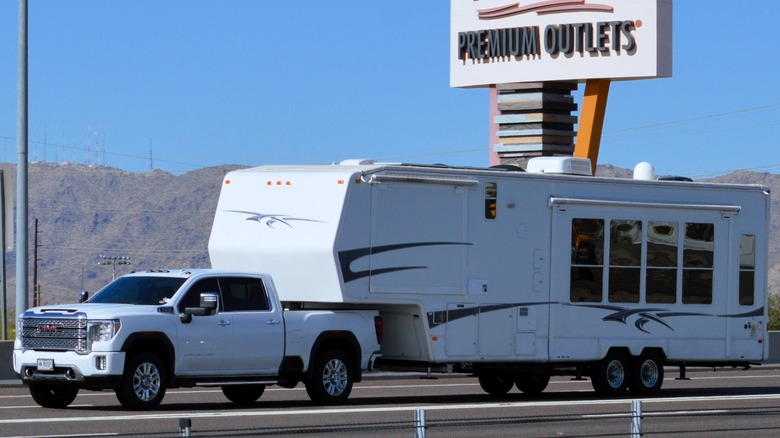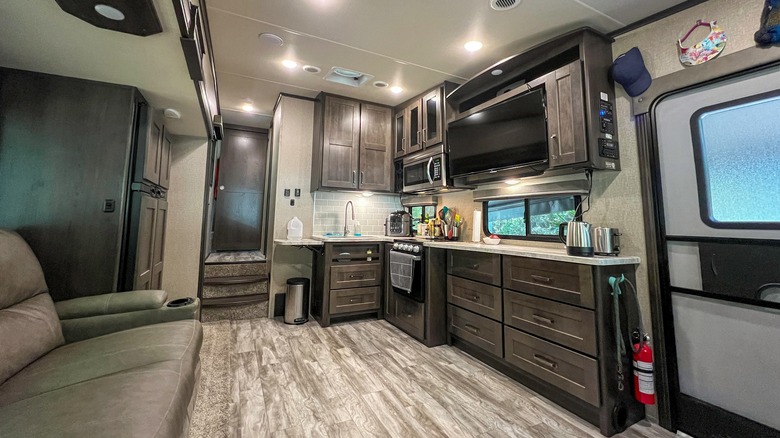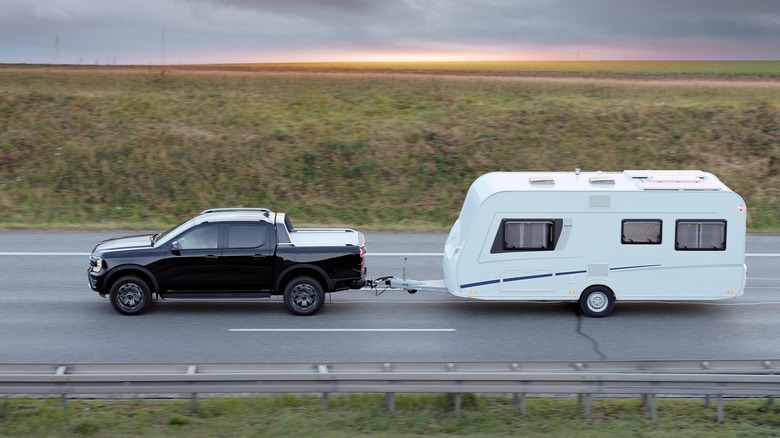Fifth Wheel Vs Travel Trailer: Which Towable RV Is The Right Choice For You?
Camping opens up a world of adventures, with options ranging from minimalist tent setups to fully equipped towable RVs. One might pitch a tent for a rugged backcountry experience or opt for a slide-in camper that fits snuggly in the truck bed. Built-out campervans offer mobility and convenience, while RVs and motorhomes typically come with more bells and whistles. However, while Class A and C motorhomes have lots of comfort features, their larger size can limit your mobility and where you can camp. That's why a towable RV may be the Goldilocks of camping setups, giving you the ability to park the spacious rig up at the campground then hop in the car and drive into town. Now, the choice narrows to two popular towable RV types: fifth wheels and travel trailers. Each offers unique advantages but the decision hinges on your lifestyle, budget, and towing preferences.
A fifth wheel is a towable RV designed for stability and spaciousness, resembling a home on wheels without the cab of a motorized RV. It connects to a specialized hitch in the bed of a pickup truck, allowing part of the trailer to extend over the truck bed for added interior space. This design makes fifth wheels ideal for long-term travelers who prioritize comfort, often rivaling the size and amenities of class A motorhomes. Travel trailers, by contrast, are hitched to the rear of a vehicle — be it a truck, SUV, or even large sedans — using a mounted trailer hitch to the vehicle's frame. They come in a broad range of sizes, from compact 12-foot models to expansive 40-foot layouts, making them the most versatile and popular non-motorized RV option. Both trailer types promise the freedom to detach your vehicle for day trips, but their differences in towing, cost, and layout demand careful consideration.
Benefits and challenges of fifth wheels and travel trailers
Both fifth wheels and travel trailers offer the key advantage of towable RVs: you can unhitch and use your vehicle independently, unlike motorized RVs where the living space and vehicle are one. They come in various sizes and floor plans, catering to solo adventurers, couples, or families. However, each has distinct strengths and drawbacks that shape their appeal. Travel trailers are often the go-to choice due to their affordability and flexibility. Starting at around $20,000 for a new model, they're significantly cheaper than fifth wheels, where even budget options start around $50,000. Their lighter weight and simpler hitch systems allow towing with a wider range of vehicles and don't require permanent truck bed modifications like the fifth wheel.
Alternatively, fifth wheels shine for those seeking a luxurious, home-like experience. Their gooseneck hitch, mounted in the truck bed, distributes weight more evenly, making the towing experience smoother and more stable, which is especially nice over long distances. Often larger than travel trailers, they boast spacious interiors with full kitchens, bathrooms, multiple sleeping areas, and ample storage space, appealing to full-time RVers or those who prioritize comfort over mobility. The trade-offs include higher costs, the need for a pickup truck, and a more complex and costly hitching system that usually requires professional installation. Their size can also limit access to smaller campgrounds, and driving can be cumbersome when trying to navigate small or winding roads. Travel trailers, while easier to maneuver and park, can be tricky to tow due to increased sway, especially without a weight distribution hitch, and smaller models often lack the amenities and variety of fifth wheels. Ultimately, choosing between the two requires that you weigh your need for space and luxury against budget, towing capability, and campground accessibility.
Questions to guide your RV purchase decision
Before committing to a fifth wheel or travel trailer, reflect on how you'll use your RV and what your priorities are. Start with your budget: travel trailers are generally more affordable, making them ideal for occasional campers or those with limited funds, while fifth wheels suit those willing to invest in a more permanent, upscale set up. Consider trip frequency and duration — short spontaneous trips favor the flexibility of a travel trailer, which can fit into more campgrounds and be towed by various vehicles. If you plan to live in your RV for extended periods, a fifth wheel's spaciousness and home-like amenities might justify the cost and truck requirement.
Next, it's important to evaluate your towing preferences and vehicle capabilities. Do you own or plan to buy a pickup truck? Fifth wheels demand one, and not all trucks can handle the weight of a fifth wheel, so research your truck's towing capacity carefully. Towing distance and terrain matter as well. Fifth wheels offer superior handling for long hauls, while travel trailers are better for shorter, off-road adventures if equipped with rugged features. Finally, think about your desired amenities and space. Families may find travel trailers too cramped, (check out these RV storage hacks) while solo travelers might not need a fifth wheel's expansive layout. It is all about your preferences. Asking these questions will help ensure your RV aligns with your lifestyle so you can fully embrace RV travel for years of memorable adventures on the road.


